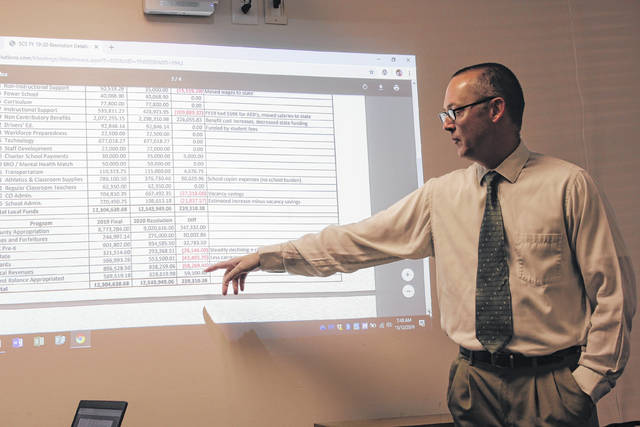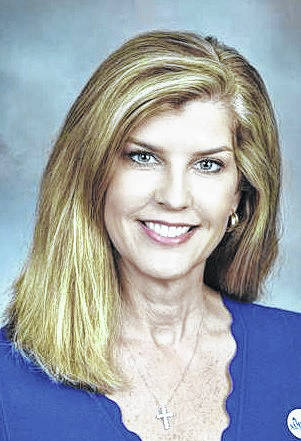It’s been five months since the start of the 2019-2020 fiscal year and leaders from Sampson County Schools are still waiting for legislators to make budget decisions.
Finance Officer Stephen Britt presented and update for a $83 million budget resolution to the Sampson County Board of Education during a Tuesday work session.
“I have never done a budget resolution entirely off of planning allotments before and estimated guesses, but that’s what we have to do today,” Britt said. “We do not have a finalized state budget yet, which impacts just about every aspect of our budget. We will have significant changes once that budget is released to us.”
Britt said a previous interim budget was used for school operations. Now, the district is running out of funds that were initially allocated or approved by the board and needs to make plans to continue. For the resolution, the state budget totals about $55.3 million for spending and revenue. The local portion is $12.54 million and federal funding totals $6.6 million. Other parts are capital outlay ($2.43 million) and child nutrition ($6 million).
Programs were listed with negative amounts because of funds not received.
“You see a lot of red and a lot of negatives, however, most of these are going to change once we have an official state budget,” he said.
Although Britt is expecting amounts to change, one of the concerning numbers was Low Wealth funding, which is distributed when a county’s ability to produce local income for public education is below the state’s average. For Sampson County Schools, it’s at $4.36 million — a $78,579 decrease from the previous period. According to officials from the North Carolina Department of Public Instruction, the amount will not change.
“When the salaries increase and benefits increase, it will make that negative number more pronounced,” Britt said. “Our (Low Wealth funding) is almost entirely constructed of teachers’ salaries, benefits and supplements.”
The highest paid teachers are usually paid through the regular teaching funds, which is $25.32 million in the state budget. Beginning educators receive money from Low Wealth funding.
“We don’t get enough position allotments to meet the needs,” Britt said. “No district does. So it fills in that gap.”
More than 370 teachers are employed throughout the district. Funding for teachers is also provided by the Academic and Intellectually Gifted program, Disadvantage Student Supplemental Funding, Career and Technical Education.
While presenting the local budget, Britt emphasized that the state budget will have a trickle-down effect. Some of the changes included insurance, a new software accounting system and benefits. One major increase was in supplies for athletics and classroom supplies, listed at more than $376,000. An extra $90,000 was budgeted to help with school copier expense to ease burdens on schools.
“Schools have been struggling to pay their copier for years and this takes the burden off of them,” he said.
In local funding, the largest amount of money comes from a Sampson County appropriation at $9 million, followed by funds from the North Carolina Pre-Kindergarten at $934,585 and local revenues at $838,259. More than $628,000 is fund balance appropriated. Some of the other totals include fines and forfeitures, $275,000; and grants, $553,500.
Later during the meeting, Britt brought up the Low Wealth matter again with concerns about stagnant funding across the state for a decade. He added that the increases of the program are significantly lower than rises mandated by the retirement system, which hurts rural school districts.
“That gap has been growing each year,” Britt said while comparing rural districts to others with more resources. “It’s true for us. It’s true for Bladen County. It’s true for Robeson County. We’re all in that same boat.
“If I can get on my soapbox and preach, I would ask that our General Assembly tie Low Wealth Funding increases to increases that are coming from the state to support salaries and benefits,” he said. “If those two were tied together, it would solve a lot of our funding issues at the rural, county level.”
Britt and Dr. Eric Bracy, superintendent of Sampson County Schools, are planning to speak with local lawmakers about the matter. There was a consensus among board members to move forward with the action.
Board chairperson Kim Schmidlin also voiced her concerns about state lawmakers not being able to reach an agreement.
“This is a lot and it’s really unfortunate that we’re operating in this way,” Schmidlin said. “We all have responsibilities as elected officials and our legislators in Raleigh have a responsibility too. They have a responsibility along with the governor to resolve this situation and this impasse that they are at, so we can get a legitimate concrete budget. It’s really unacceptable that we find ourselves in November without a budget.”
The budget resolution is scheduled to be approved at the next regular board meeting, scheduled for 7 p.m. Monday, Nov. 25, at Hobbton Middle School, 12081 Hobbton Hwy., Newton Grove. A floating reception will be held to congratulate the Finance Committee for their 2017-2018 awards and accomplishments. It is scheduled for 6:15 to 6:45 p.m. before the board meeting.


